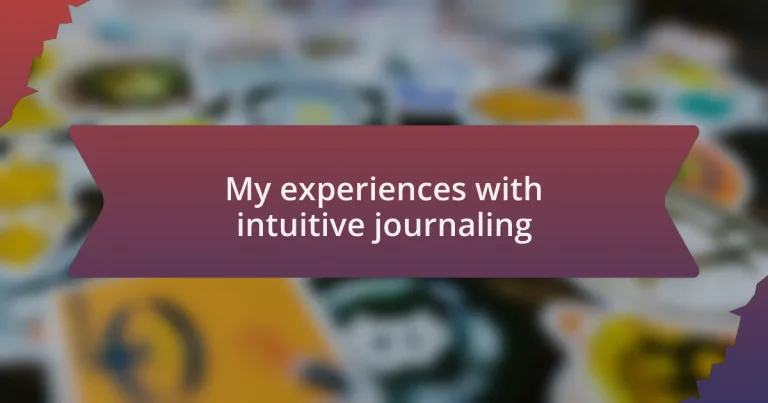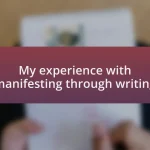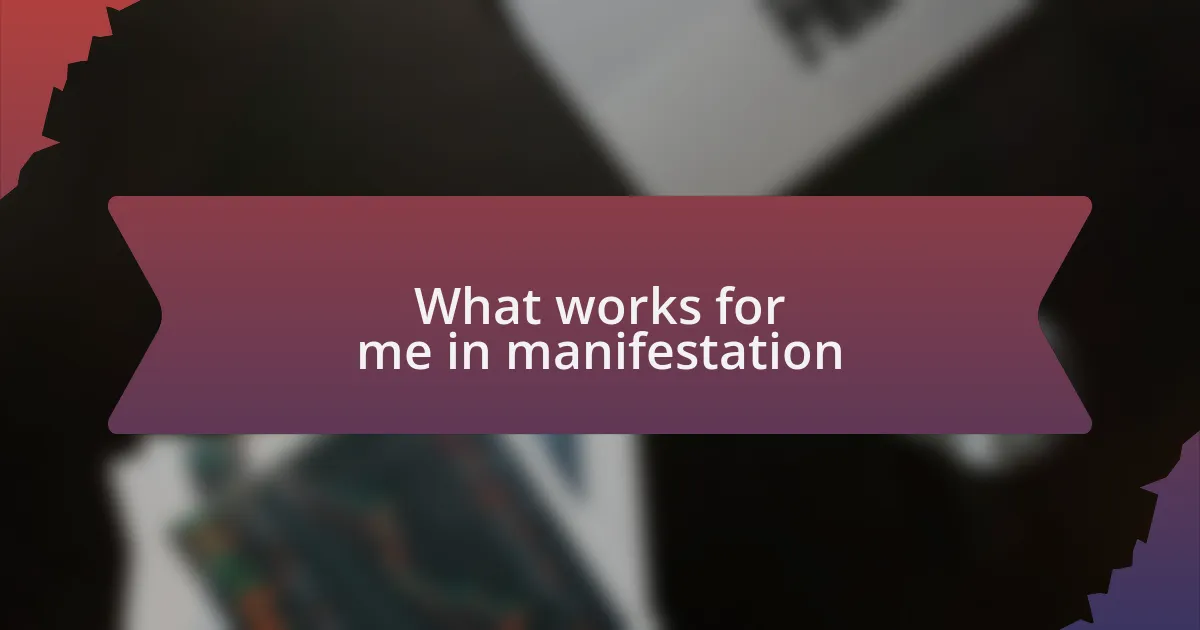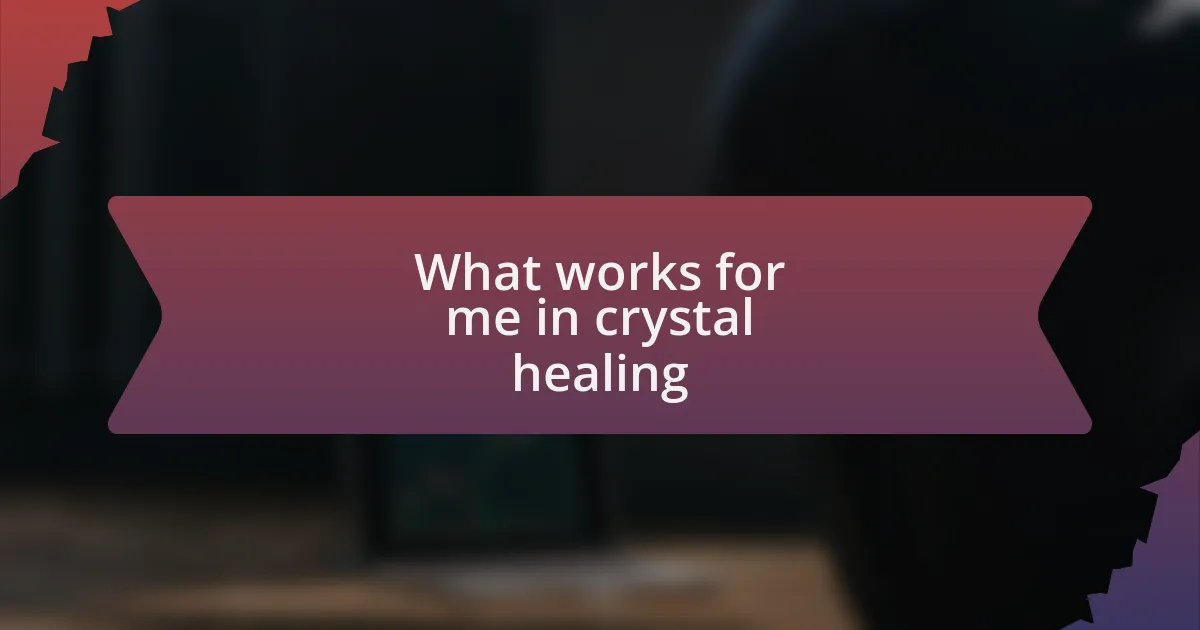Key takeaways:
- Intuitive journaling fosters deep self-awareness and emotional release, allowing for spontaneous insights and creativity.
- Choosing the right tools, such as unlined notebooks and varied writing instruments, enhances the journaling experience and stimulates inspiration.
- Establishing a routine, practicing stream-of-consciousness writing, and integrating sensory experiences can significantly improve the effectiveness of journaling.
- Challenges such as self-doubt and emotional overwhelm are common, but overcoming them contributes to valuable lessons in self-acceptance and the importance of process over perfection.
Author: Evelyn Hartman
Bio: Evelyn Hartman is a contemporary author known for her evocative storytelling and rich character development. With a background in psychology, she weaves intricate narratives that explore the complexities of human relationships and personal growth. Her debut novel, “Whispers in the Wind,” garnered critical acclaim and established her as a powerful voice in modern literature. Evelyn resides in the Pacific Northwest, where she draws inspiration from the vibrant landscapes and diverse communities around her. When she’s not writing, she enjoys hiking, gardening, and spending time with her two rescue dogs.
Definition of intuitive journaling
Intuitive journaling is a personal practice that invites us to connect deeply with our inner thoughts and feelings. Imagine sitting quietly with a notebook, allowing your pen to flow freely without judgment. This practice encourages spontaneity, letting emotions and ideas emerge organically, which can often lead to unexpected insights.
I remember one night, feeling overwhelmed after a long day. I picked up my journal and began to write whatever came to mind. It was liberating! It felt as if my subconscious was guiding my pen, revealing truths I hadn’t fully acknowledged. Have you ever experienced such moments when writing feels like a conversation with yourself?
The beauty of intuitive journaling lies in its simplicity; it doesn’t require specific prompts or formats. Instead, it’s about trusting your instincts. In my experience, this approach can unlock creativity and self-discovery, making it a powerful tool for personal growth. How do you think connecting with your inner thoughts might change your perspective?
Benefits of intuitive journaling
Engaging with intuitive journaling has brought me a clearer sense of self-awareness. As I scribbled down my thoughts one evening, I was astonished by what I learned about my fears and aspirations. Have you ever had a moment where your own words reveal deeper truths? It’s as if the act of writing acts as a mirror, reflecting parts of myself that I hadn’t considered before.
One of the most rewarding benefits I’ve experienced is emotional release. I recall a particularly stressful week when I poured my frustrations onto the pages of my journal. The weight I felt lifted almost immediately, as if letting go of those bottled emotions not only cleared my mind but also lightened my heart. How liberating would it feel to release your inner turmoil through simple pen strokes?
Additionally, I’ve found that intuitive journaling sparks creativity in unexpected ways. During a creative block, I took a moment to write without any agenda, and suddenly, ideas began to flow. Have you ever tapped into your imagination in such an unstructured way? By relinquishing control, I discovered new ways of thinking, proving that sometimes, letting go paves the way for inspiration.
Tools for intuitive journaling
When it comes to tools for intuitive journaling, I’ve found that the type of journal you use can make a significant difference. I prefer a blank, unlined notebook, as it allows my thoughts to flow freely without the constraints of structured lines. Isn’t it fascinating how the physical medium can influence our mental process? Choosing a beautiful journal that resonates with me can ignite my desire to write, transforming the experience into something sacred.
I also embrace various writing instruments in my practice. Using colored pens and markers adds a playful element to my journaling. One evening, as I doodled alongside my reflections, I noticed how the colors enhanced my mood and opened my mind to deeper connections within my thoughts. Have you ever experienced how the little things can enhance creativity? I believe that having an array of tools can serve as a catalyst for inspiration, making the journaling process feel more like an intimate conversation with myself.
Additionally, I incorporate prompts or questions that challenge my thinking. For instance, I once wrote about a dream that lingered in my mind, leading me to uncover unresolved feelings. This practice not only deepened my self-understanding but also allowed me to confront emotions I had been hesitant to address. Have you ever used questions to unlock insights? I’ve discovered that thoughtful prompts can guide us into realms we may not naturally explore, making the journaling experience profoundly revealing.
Techniques for effective journaling
One technique that has transformed my journaling practice is setting a specific time each day to write. I noticed that those moments filled with quiet reflection led to my most authentic thoughts. Have you ever felt the difference when you choose a particular time to connect with yourself? For me, mornings worked wonders, as the world was still and my mind was clear, allowing the words to flow with ease.
Another approach I find valuable is stream-of-consciousness writing. This means I don’t edit or censor my thoughts as they pour onto the page. I remember one afternoon when the idea of letting go took hold of me; I wrote without stopping for fifteen minutes straight. The experience was electrifying, as my true feelings surfaced in ways I wasn’t fully aware of. Can you imagine unearthing hidden emotions just by letting your pen glide freely? It’s a liberating exercise that can lead to profound insights.
Lastly, I like to integrate sensory experiences into my journaling sessions. For instance, I light a scented candle and focus on the aroma while I write. One scent, in particular, conjures memories of childhood, which sometimes shapes my reflections in surprising ways. Have you ever noticed how your environment shapes your thoughts? By anchoring my writing in sensory experiences, it becomes more immersive and deeply personal, enriching my overall journaling journey.
Challenges faced in my journey
Engaging with intuitive journaling wasn’t always a smooth ride for me. Early on, I struggled with self-doubt, questioning whether my thoughts were valid enough to commit to paper. I often found myself staring at a blank page, feeling paralyzed by my own expectations. Have you ever been there, grappling with the fear of putting your true self out into the world? It took time for me to realize that this was part of the process—learning to embrace my imperfections led to richer journaling experiences.
Another significant challenge was navigating emotional overwhelm. I distinctly remember a session when I confronted a past trauma that surfaced while writing. The intensity of my feelings felt almost too much to handle, and there were days when I wondered if journaling was more of a burden than a release. I had to learn to walk a fine line between exploring my feelings and taking care of my mental health. How do you balance the demand for honesty in your writing with the need to protect your emotional well-being?
As I continued my journey, finding consistency became another hurdle. I often let the busyness of life interfere with my journaling practice. I was constantly torn between the day’s obligations and my desire to explore my thoughts. I even missed days when I promised myself I’d write. Looking back, what I learned is that journaling doesn’t need to be perfect or regular to be valuable. Sometimes, even short, sporadic entries captured the essence of what I was experiencing. Have you ever felt that even a brief moment of reflection could speak volumes? It was those fleeting instances that unraveled some of my deepest insights.
Lessons learned from intuitive journaling
Engaging in intuitive journaling taught me the powerful lesson of self-acceptance. I remember once, flipping through my previous entries and noticing how raw and unfiltered my thoughts were. Instead of feeling embarrassed, I felt a deep sense of connection to my journey, realizing that vulnerability often leads to the most profound insights. Have you ever recognized your own growth in the face of honesty?
Another significant lesson emerged from embracing spontaneity in my writing. I began to understand that sometimes, the most wonderful ideas sprout from unexpected moments. I still recall a night when I jotted down a fleeting thought after a ghost podcast episode stirred my imagination. That single line turned into an entire exploration of my beliefs about the paranormal. Isn’t it amazing how a simple spark can illuminate entire pathways of thought?
Most importantly, intuitive journaling has taught me to cherish processing over perfection. I discovered that even entries littered with typos or unfinished sentences could reveal important revelations. After a particularly chaotic week, I vented my frustrations in a messy, stream-of-consciousness entry. Looking back, that chaotic energy transformed into clarity and direction for my next steps. Have you noticed how the act of writing itself can guide you, even when the outcome isn’t pristine?





